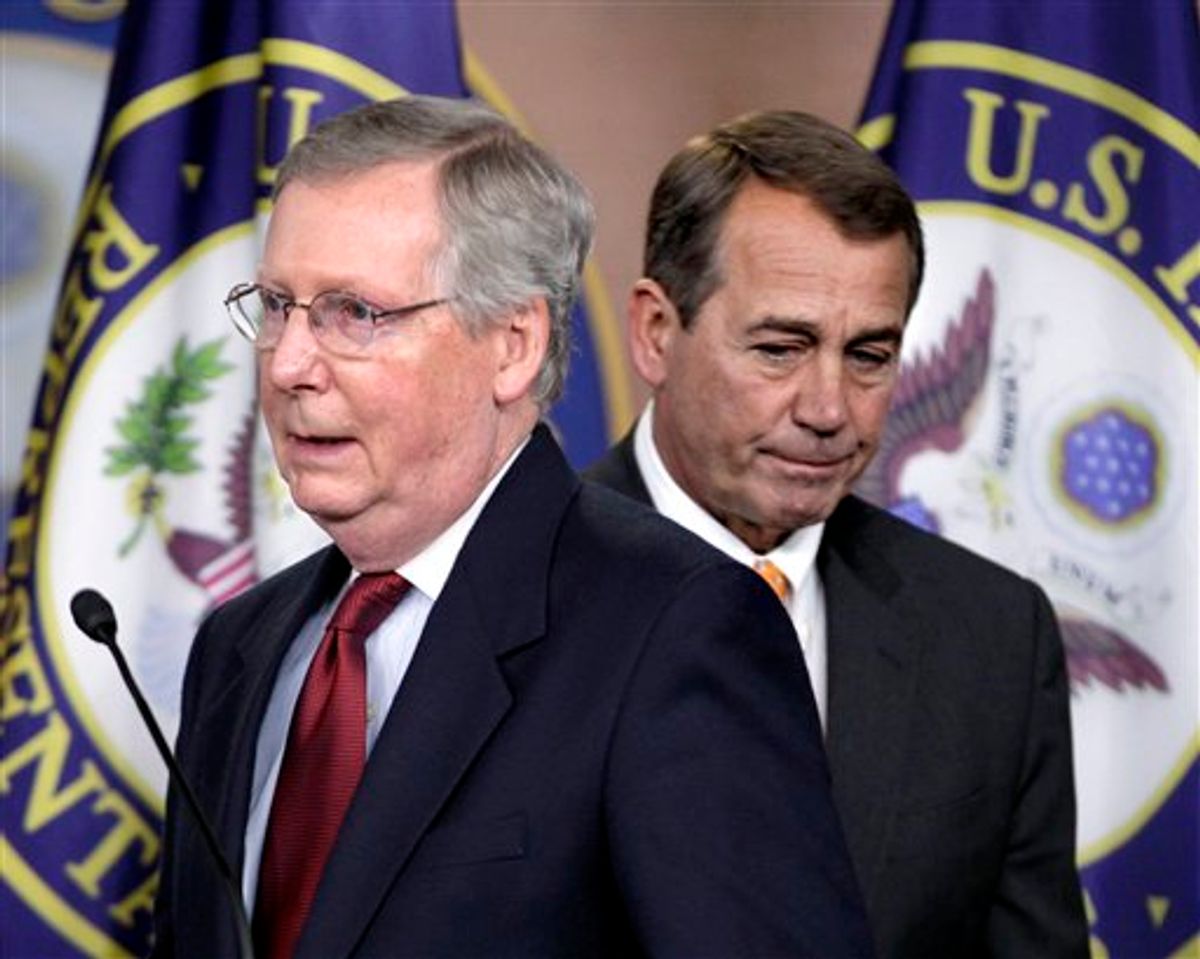At Capital Gains & Games, inveterate budget watcher Stan Collender makes a not quite convincing argument that Republicans would be misreading "the political tea leaves" if they don't move immediately to shut down the federal government.
The current "continuing resolution" that funds all government agencies operating under annual appropriations will expire in December. So even before the new Congress begins, Republicans have an opportunity to put some beef behind their campaign promises to cut government spending by filibustering any attempt to extend the resolution.
Collender believes that if Senate Republicans fail to oppose an extension, they will enrage their Tea Party base, set themselves up for the possibility of leadership challenges when the new Congress begins, and create logistical difficulties that will hinder their chances next year of getting the kinds of spending cuts they want. Maybe so, but I find some difficulty in accepting that the Republicans will be playing from a weaker hand once they have an imposing majority in the House and a smaller minority in the Senate.
The more provocative question is in what universe does it make sense to shut down the government when the economy is barely alive and unemployment is pushing 10 percent? My Salon colleague Steve Kornacki did a great job in September of explaining how the budget showdown between Newt Gingrich and Bill Clinton turned into a political disaster for Republicans. It's hard to see how we're not due for a rerun.
A few years ago, the Congressional Research Center produced a nice summary of the 1995-96 shutdown. Here are some highlights.
- Health. New patients were not accepted into clinical research at the National Institutes of Health (NIH) Clinical Center; the Centers for Disease Control and Prevention ceased disease surveillance (information about the spread of diseases, such as AIDS and flu, were unavailable); hotline calls to NIH concerning diseases were not answered; and toxic waste clean-up work at 609 sites stopped, resulting in 2,400 "Superfund" workers being sent home.
- Law Enforcement/Public Safety. Delays occurred in the processing of alcohol, tobacco, firearms, and explosives applications by the Bureau of Alcohol, Tobacco, and Firearms; work on more than 3,500 bankruptcy cases was suspended; cancellation of the recruitment and testing of federal law-enforcement officials occurred, including the hiring of 400 border patrol agents; and delinquent child-support cases were suspended.
- Parks/Museums/Monuments. Closure of 368 National Park Service sites (loss of 7 million visitors) occurred, with local communities near national parks losing an estimated $14.2 million per day in tourism revenues; and closure of national museums and monuments (estimated loss of 2 million visitors) occurred.
- Visas/Passports. 20,000-30,000 applications by foreigners for visas went unprocessed each day; 200,000 U.S. applications for passports went unprocessed; and U.S. tourist industries and airlines sustained millions of dollars in losses.
- American Indian/Other Native Americans. All 13,500 Department of Interior Bureau of Indian Affairs (BIA) employees were furloughed; general assistance payments for basic needs to 53,000 BIA benefit recipients were delayed; and estimated 25,000 American Indians did not receive timely payment of oil and gas royalties.
- American Veterans. Major curtailment in services, ranging from health and welfare to finance and travel was experienced.
- Federal Contractors. Of $18 billion in Washington area contracts, $3.7 billion (over 20 percent) were managed by agencies affected by the funding lapse; the National Institute of Standards, was unable to issue a new standard for lights and lamps, scheduled to be effective January 1, 1996; and employees of federal contractors were furloughed without pay.
When Clinton and Gingrich tussled, the economy was in pretty good shape, but the general public still viewed the shutdown as irresponsible. How will curtailing government services while furloughing and eventually firing hundreds of thousands of government workers play in the current climate?

Shares